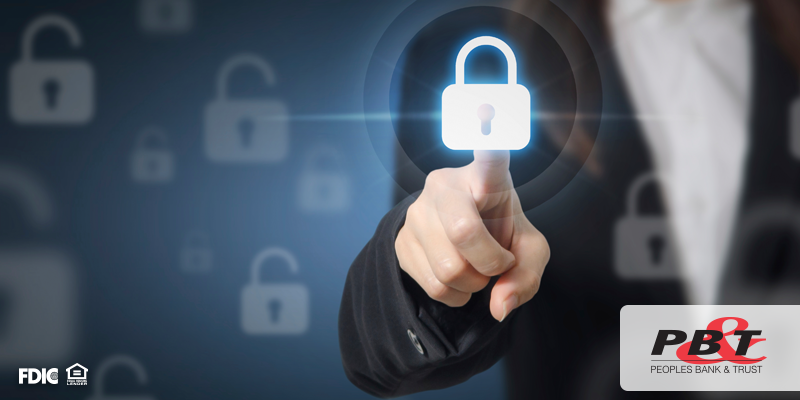
Phishing as defined by Merriam-Webster is “A scam by which an e-mail user is duped into revealing personal or confidential information which the scammer can use illicitly.” Scams like these happen each and every day, and many times, the victims don’t even realize they’re participating in them. Peoples Bank & Trust wants to help you avoid these common tactics many cyber criminals use to lure you in. If you hear or recognize any of the following prompts, hang up the phone or delete the email immediately before acting on it any further.
- Relative who is in need abroad. This scam can be delivered via phone or email, typically with an individual claiming to be a cousin or niece/nephew. This person asks you how you are doing and makes some remarks to indicate a tie to family. In all appearances, they come off as someone you know and care for. The individual contacting you will typically share the news that they have come into some trouble while traveling, and he/she doesn’t have the appropriate funds while vacationing to resolve it. Then, this person will ask if you would be so kind as to wire them some funds to help them through this circumstance, and they will happily pay you back once they return. The best way to confirm this is a scam is call the relative they are claiming to be, or call that person’s parent to see if the story truly checks out. Ninety-nine percent of the time it will not, and then you know that the person contacting you is a fraud. At this point, we recommend reporting them to the police and ceasing all contact.
- Foreign lottery winner. This scam is pretty clear cut. Typically via phone, someone will call and claim that you have won a fantastic prize courtesy of the lottery in an overseas country. After the initial surprise has you jumping for joy, the caller informs you that there is a small five percent fee to wire you the funds. If you can quickly transfer them the funds, you will have your money within a given time frame. DO NOT SEND ANY FUNDS OR GIVE OUT ANY INFORMATION. Unless you distinctly remember buying a ticket for a lottery in another country, this call is most certainly a scam. Many victims of this example never received any further funds as their winnings, and further lost the money they were conned into sending.
- IT help in disguise. This scam has been the downfall of many companies. Done over both phone and email, cybercriminals have found a frightening loophole in many cyber security policies. Generally, this scenario starts with an administrator receiving a call or email from someone who appears to be from their IT department. Incoming phone calls can be masked to have recognizable numbers, and email address can appear to be from a legitimate person with the exception of one changed letter. The person sending the communication will typically identify themselves as someone within the company who has a high access level, and then ask for the verification of various passcodes or other information. Often times, this scam succeeds because employees want to help one another, and don’t always spotlight the source upon receipt. To help prevent this, we suggest that businesses have a rigid identification policy when sharing confidential information via phone or email.
- Urgent change to your information. In many situations, the factor of urgency is what makes victims coherent to a stranger. To further push that sense of emergency, the caller in this situation claims that there has been a breach to your financial or lending institution and you need to update your login information immediately. The caller, of course, is willing to update it for you, if you can simply state your current username and password, along with what you would like it updated to. DO NOT GIVE OUT ANY OF THIS INFORMATION. Anytime your bank or other financial institution would like you to reset your password, or make an update to your account, they will ask you to complete it through your online banking portal or by visiting your nearest branch. By no means should you ever need to give out your information by phone to ensure that a username or password is changed.
As you can see, there are numerous situations that could catch anyone. We hope to decrease the likelihood of scams amongst our customers, and offer additional cyber security tips on our website! If you feel you could be more proactive against threats like these, visit our website today and see how you can avoid unfortunate situations such as these.
Peoples Bank & Trust Co.
Member FDIC
Equal Housing Lender


